Consensus emerges ahead of racism summit
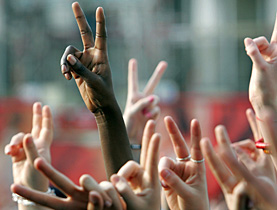
Ahead of the United Nations racism summit in Geneva, Switzerland has joined other countries in backing a revised declaration aimed at avoiding a possible boycott.
The Durban Review Conference has been under pressure with several countries and the European Union threatening to stay away over concerns the meeting could become an anti-Semitic forum.
Its draft declaration aims to become a global blueprint for addressing racism, racial discrimination, xenophobia and intolerance.
A new version was circulated on Tuesday with the most controversial elements about the Middle East and the defamation of religions removed.
Direct references to Israel were taken out but the document does affirm support for the declaration of the first racism summit, the World Conference Against Racism, Racial Discrimination, Xenophobia and Related Intolerance, held in Durban in 2001, which linked the Israeli-Palestinian conflict to the problem of racism.
In a show of support on Thursday, several countries from Europe and representing all of the UN’s regional groups adopted a declaration backing the new draft text. They also called for negotiations to continue.
Minor differences
“The ball is now in the West’s court,” Geneva consultant Yves Lador told swissinfo.
Senior UN officials welcomed the revised declaration as an opportunity to salvage the conference.
“I believe there should now be no major barrier to reaching a successful outcome,” said UN High Commissioner for Human Rights Navi Pillay.
“I sincerely hope it is the breakthrough needed to reach a consensus on a text that can concretely help hundreds of groups and millions of individuals who are victims of racism and other forms of intolerance around the world.”
Martin Ihoeghian Uhomoibhi, president of the UN’s 47-nation Human Rights Council, said he was confident that minor differences remaining in the draft could be resolved ahead of the meeting.
The United States and Australia have called for changes to the text and will not take part officially in the summit. Israel, Canada and Italy announced last year they were not participating.
“Unacceptable to Israel”
Israel however rejected the amended version of the declaration and continued to call for a boycott.
The 17-page text does not mention Israel specifically, whereas the previous 60-page version devoted four paragraphs to Israel and the Palestinian question.
“In its very first paragraph, the current paper reaffirms the 2001 outcome document which singles out Israel and characterises the [Middle East] conflict as one of race,” ambassador Aharon Leshno-Yaar said.
“This is something that is totally unacceptable to Israel.”
Western countries’ other argument that religious defamation be excluded from the document as it could be used as a pretext to curb freedom of speech has also been accepted.
Demands for compensation for the slave trade and European colonisation were dropped.
Requests by the Vatican and African and Muslim countries that the issue of homosexual discrimination not be included in the draft declaration were also agreed.
Compromise
“After a phase in which everyone raised the stakes, it’s time to compromise,” Adrien-Claude Zoller, the director of the non-governmental organisation Geneva for Human Rights, told swissinfo.
He expects the new document should prevent any further escalation of disputes during talks ahead of the conference.
It is a hope shared by Pillay, who has called on states not to adopt extreme, political or controversial positions but rather to work together to ensure the success of the meeting.
Lador added: “Now we will see if those backing the boycott are sincere in their criticism of the conference or if they want to sabotage it.”
He notes that the objective of a boycott is to undermine the UN and its multilateral negotiating framework and adds that authoritarian and dictatorial regimes will continue to chip away at declarations that involve human rights.
Zoller explains that at least two points have helped remove potential minefields from the negotiations: the High Commissioner for Human Rights’ strong commitment to a compromise, and the signals sent by the new US administration of its willingness to commit to a peace agreement in the Middle East.
“But as long as this [Middle East] conflict is not the subject of an international conference, it will pop up at any opportunity presented by the UN,” he added.
swissinfo, based on an article in French by Frédéric Burnand in Geneva
The United Nations Durban Review Conference will take place in Geneva from April 20-24 and will evaluate progress towards the goals set by the World Conference against Racism, Racial Discrimination, Xenophobia and Related Intolerance in Durban, South Africa, in 2001.
The Review Conference is intended to serve as a catalyst to fulfil the promises of the Durban Declaration and Programme of Action agreed at the 2001 World Conference.
The 2001 conference was a landmark event in the struggle to improve the lives of millions of victims of racial discrimination and intolerance.
After a wide-ranging debate, the conference adopted by consensus the Durban Declaration and Programme of Action (DDPA), which provided a new framework for guiding governments, non-governmental organisations and other institutions in their efforts to combat racism, racial discrimination, xenophobia and related intolerance.
Among its measures for combatting racism are including strengthening education, fighting poverty, improving resources available to victims of racism, and bolstering respect for the rule of law and for human rights.
The UN notes that while progress has been made since 2001, there is a continued need for committed implementation of the DDPA.
The decision to convene the Durban Review Conference was made by UN Member States at a General Assembly meeting in 2006 and the UN Human Rights Council was asked to prepare the process.

In compliance with the JTI standards
More: SWI swissinfo.ch certified by the Journalism Trust Initiative

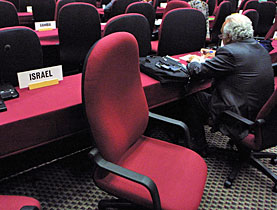
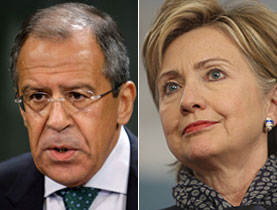
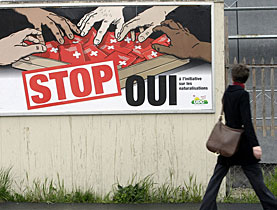
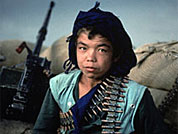
You can find an overview of ongoing debates with our journalists here. Please join us!
If you want to start a conversation about a topic raised in this article or want to report factual errors, email us at english@swissinfo.ch.